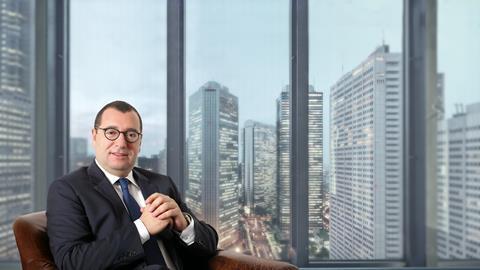In a region held back by wars, zero growth and strained diplomatic relations, Farid Chedid says it’s vital that companies show resilience
Global Reinsurance speaks with Chedid Re chief executive Farid Chedid about challenges and opportunities in the Middle East, given the current global climate within the industry, and the role Dubai will play in the region’s future.
What is the current climate within the Middle East and how is that impacting its position within the industry?
In the Middle East today, there are three distinct parts. One part that is affected by war – countries like Syria, which is also sanctioned, Libya and Iraq – and here, from a security point of view, the situation is quite bad.
You have another part, which is related mainly to the Gulf region and Egypt. These countries other than the budget deficit have no issue and have no turbulence, the problem is
the relationship between these countries ¬– specifically between Qatar and Saudi, UAE, Bahrain, and Egypt. This is very difficult to comment on.
And you have other areas and territories in the region which are generally politically stable like Morocco and others that are affected by what is going on in other parts of the region. Countries like Lebanon and Jordan, are facing a huge influx of refugees from Syria.
All of these aspects – war, instability, difficult foreign relations, refugees – are having a huge impact on the entire region, and it is creating uncertainty. The uncertainty is a major challenge and drawback for private investment, so the entire region now is in a ‘wait-and-see’ situation.
Are there other challenges being faced by the region?
You also have the price of oil. That has affected oil-producing countries tremendously. Now, all of the oil-producing countries are working hard to fix their budgets, reduce the deficit, to make sure they have sustainable economies. These countries are currently looking for ways and means to diversify their economies. It is an extremely, extremely challenging time for the region, because you have two major threats, again, political instability, and the price of oil.
Furthermore, after their economies saw fast growth up until 2013, today there is virtually no growth. Insurance companies and brokers thrive when there is growth, so the fact that there is no growth now is also a major impact.
This lack of growth is paired with difficulty on the investment side, as the investment opportunities in the region are very limited due to the political and economic situation.
’It’s an extremely challenging time because of two threats: political instability and the price of oil’
What is being done to combat these challenges in the region?
In a time of crisis, the most resilient are the companies that will survive. The companies with strong management, and strong and committed shareholders, tend to benefit from these situations. The crisis in the region is going to accelerate the desire for consolidation, driven by one very important stakeholder group in each and every market: the regulators.
And the regulators in all territories are toughening up, strengthening regulations, and increasing requirements. This is because the regulators are seeing the problems, they are seeing the crises, and they want to make sure that the companies are resilient. So whilst, in the short term, the industry is going through this very difficult time, I think it will be survival of the fittest.
What are the current opportunities for the region within the current regional and global climate, taking into account the likes of Brexit?
The insurance companies in the Middle East have traditionally had a very close working relationship with Western companies, whether they are international insurers or global reinsurers.
Dubai is the reinsurance hub for the Middle Eastern region. But Dubai has become the reinsurance hub for the region independently, and way before Brexit. With that said, Dubai as a reinsurance hub is one of the main hubs available globally. It is one of the most successful, okay. And the more there is globalisation, the more you will see Dubai developing.
One of the reasons London is an industry leader is because of the entrepreneurial spirit and all the facilities available within London in terms of human resources and technical human resources in the services around the insurance and reinsurance industry. The banks, the legal, the auditors, the actuaries, etc.
We are seeing these services also developing in Dubai – in Dubai you’ll find highly qualified auditors, banks, and so on, both local or international. All of this is helping Dubai to grow further. The main hurdle that we have in the Middle East is the fact that licencing from one country to the other is very difficult almost impossible.
Chedid Re, a company of Chedid Capital Holding, is the story of an exceptional team comprised of ambitious individuals who are constantly seeking success. Over the years, Chedid Re has become a leading institution with over 300 employees and operations running in more than 45 countries; in 2015, it was listed among the top 20 reinsurance brokers in the world.
With a devoted team of experts based in Beirut, Casablanca, Dubai, Limassol, London and Riyadh, we strongly believe in integrity, professionalism, loyalty, and are committed in adhering guidelines, and in ensuring delivery in growth and profit projections. This has enabled us to become an intermediary of choice for many regional and international capacity providers for the insurance market.
In addition to our reinsurance broking services, we manage multiple underwriting agencies with a well established and successful track record as an approved Lloyd’s coverholder, authorized by various syndicates at Lloyd’s and other regional and international reinsurers, to underwrite risks, participate in contracts of reinsurance, and issue documentation on their behalf.
In June 2015, Chedid Re was registered as a Lloyd’s broker. The approval came as a natural extension for our longstanding and successful cooperation with Lloyd’s that started at the very beginning, 19 years ago.








No comments yet